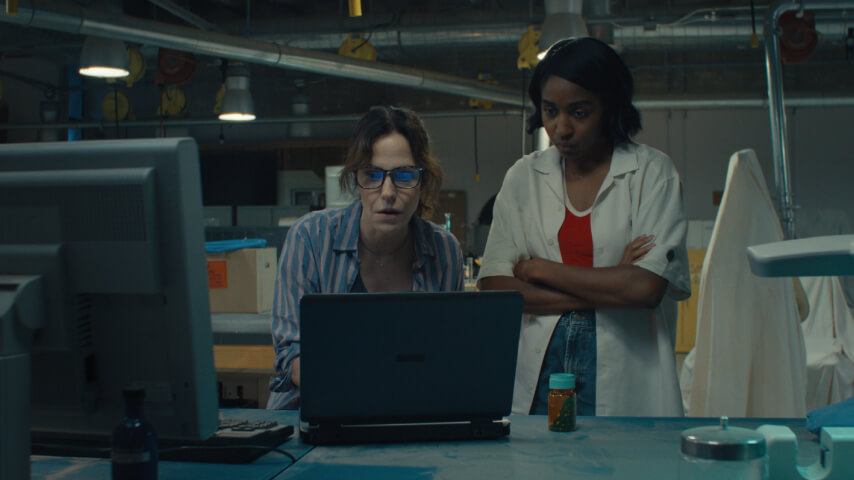Mediocre sci-fi Omni Loop needs the chance for a do-over
Neither exploiting its time loop conceit for laughs nor emotional impact, Bernardo Britto's film should go back for another try.
Photo: Magnolia Pictures
Measuring end-of-life anxiety with an open heart if not the most disciplined head, science-fiction-tinged drama Omni Loop serves up a couple nice moments for its lead performers, but otherwise relies on a viewer’s offscreen feelings about mortality to supply its punch. The result, pleasant enough but frustratingly bland, exists in a soupy, ill-defined emotional middle ground—occasionally amusing but not quite funny, and unable (or unwilling) to substantively commit to thoughtful, penetrating melancholia.
Written and directed by Bernardo Britto, the Florida-set Omni Loop centers on Zoya Lowe (Mary-Louise Parker), a theoretical physicist who, along with her husband Donald (Carlos Jacott), has written a series of academic textbooks. Diagnosed with a black hole in between her lungs, Zoya is given a week to live, and sent home to spend that time with her small family, which includes daughter Jayne (Hannah Pearl Utt).
When her nose starts to bleed during an early birthday celebration, Zoya excuses herself, slips into the bathroom and pops a regenerating pill from a bottle in her medicine cabinet, which takes her back to the hospital five days earlier. This reaction isn’t a magical, one-off fluke of some prescription medication, though; it spoils nothing (since the movie actually opens with 12-year-old Zoya finding a pill bottle) to note that she has had this ability her entire adult life.
In conflict with the terminal nature of her diagnosis, Zoya crosses paths with Paula (Ayo Edebiri), a student at a local university. Needing both lab access as well as a sounding board, Zoya recruits Paula to help attempt to unravel the chemical composition of the pills, perhaps then allowing her to stave off death.
From comedies like Groundhog Day and Palm Springs to action fare like Source Code and Edge Of Tomorrow, “replay loop” films have a rich history, their plots speaking to the imaginative possibilities (and often futility) of repeatedly trying to set things right. Omni Loop, though, offers up a fairly lackluster, back-foot treatment of its time travel concept. After injecting his movie with a few bits of daring (in addition to the pills, Zoya and Paula enlist the research assistance of an unseen scientist who is exponentially shrinking down to microscopically small levels), Britto’s script doesn’t have the guts to do much with them. Worse, it doesn’t even treat these genre elements honestly, or consistently.
While Omni Loop connects the dots a bit on Zoya’s temporal leaps professionally (a mentor lambasts her impatience, entitlement, and laziness), the film doesn’t grapple at all with what the abused ability to jump back in time has meant for her personal relationships. The post-pandemic fracturing of memory has been fertile narrative terrain in independent cinema, but the scripted origins of Omni Loop actually stretch back almost eight years, long before COVID-19, as Britto’s script was selected for the Sundance Institute’s Screenwriting Lab in 2016. Knowing that, it’s difficult to parse the chain of custody on its failures, and ascertain whether they come from half-heartedly incorporating at-odds notes or attempting to integrate disparate components from entirely different drafts over the years.
If a film isn’t going to play with the conceit of temporal repetition for comedic effect, then its engagement and catharsis are necessarily more attached to its characters’ pangs of time-bent wistfulness. A movie can funnel its narrative through a highly subjective point-of-view, or show us the power of a fractured relationship repaired. Omni Loop opts for neither; Paula especially isn’t sharply drawn, and the film fumbles its way through the one big scene that has a chance to elevate her, giving her some motivation parallel to Zoya’s.
 Keep scrolling for more great stories.
Keep scrolling for more great stories.
